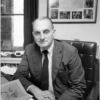Louis Auchincloss

Louis Auchincloss
Louis Stanton Auchincloss was an American lawyer, novelist, historian, and essayist. He is best known as a prolific novelist who parlayed his experiences into books exploring the experiences and psychology of American polite society and old money. His dry, ironic works of fiction continue the tradition of Henry James and Edith Wharton...
NationalityAmerican
ProfessionNovelist
Date of Birth27 September 1917
CityLawrence, NY
CountryUnited States of America
As the classes in modern life come together, we have become much more intensely class conscious. It's a very curious thing. But I deal with human beings with whom I've come in contact and have had a chance to closely observe. Their upper-classness is not a matter of particular fascination for me.
Your literary style reflects your personality.
You don't know the things in your childhood that influence you. You can't possibly know them. People today try to analyze the early environment and the reasons for something that happened, but if you look at children of the same family -- children who have identical parents, go to identical schools, have an almost identical upbringing, and yet who have totally different experiences and neuroses -- you realize that what influences the children is not so much the obvious externals as their emotional experiences. Of course any psychiatrist knows that.
Perfection irritates as well as it attracts, in fiction as in life.
Only little boys and old men sneer at love.
Novels must have verisimilitude, and truth has little enough of that.
I think Shakespeare got drunk after he finished King Lear. That he had a ball writing it.
If you can sense the corruption in me, it is ... because there's a dose of it in you.
Once somebody's aware of a plot, it's like a bone sticking out. If it breaks through the skin, it's very ugly.
It's very rare that a character comes to mind complete in himself. He needs additional traits that I often pick from actual people. One way you can cover your tracks is to change the sex.
A lot of writers ... sit in a log cabin by the lake and put their feet up by the fire in the silence and write. If you can have that that's all very well, but the true writer will learn to write anywhere -- even in prison.
The crowd has a way of being right.
Today is not forever.
I don't particularly care about having [my characters] talk realistically, that doesn't mean very much to me. Actually, a lot of people speak more articulately than some critics think, but before the 20th century it really didn't occur to many writers that their language had to be the language of everyday speech. When Wordsworth first considered that in poetry, it was considered very much of a shocker. And although I'm delighted to have things in ordinary speech, it's not what I'm trying to perform myself at all: I want my characters to get their ideas across, and I want them to be articulate.